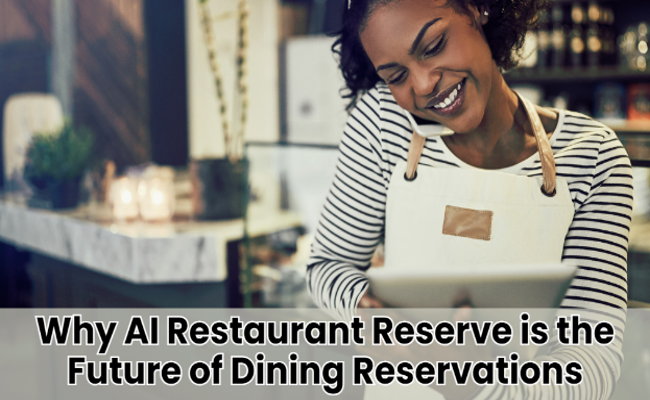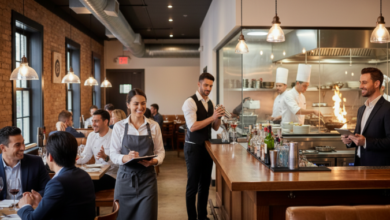Why AI Restaurant Reserve is the Future of Dining Reservations

Do you ever try to reserve a table at your favorite restaurant, only to face long waits, miscommunication, or even lost bookings? In today’s fast-paced world, traditional table booking methods often disappoint.
Fortunately, AI-driven restaurant reservation systems upend this paradigm, adding finesse to a diner’s experience along with the efficiency of the restaurants. Online restaurant reservations powered by AI are not a fad; they are, in fact, the future of dining.
Enhanced Customer Experience
The dining experience, from reservation to service delivery, can be streamlined through AI phone answering services. This ai phone answering service help reduce the need for long hold times and interactions with outdated booking methods. Many of these AI systems are hardwired with the processing of natural language.
Users can easily reserve a table, check availability, select table preferences, and request special accommodations. Whether through an app, website, or voice assistants, AI integrates with different platforms to make the reservation process easier.
AI systems easily accommodate last-minute changes, such as adjusting the headcount or reservation time. The AI can accommodate these changes on the spot without inconveniencing customers, thus ensuring flexibility and responsiveness in bookings.
Smart Table Management

For restaurant managers, efficiency in table management directly impacts profitability and customer satisfaction. Traditional booking systems require manual input to arrange and assign tables based on guest count, preferences, and time.
AI-powered restaurant reserve systems can automate this process intelligently by allotting tables to optimize seating arrangements and reduce wait times.
AI engines analyze dining duration trends, peak times, and cancellations to create an optimal seating arrangement. Therefore, restaurants can avoid having empty tables while seating more guests and minimize potential losses due to inefficient seating.
For restaurants with various seating areas, such as indoor, outdoor, or bar sections, AI can quickly assign guests based on availability and preference.
Additionally, AI systems predict busy and slow periods using historical data, helping restaurant staff prepare better and optimize resource use. With AI-driven systems, the dining experience meets higher standards because efficient table turnover is assured and waiting time is minimized.
Personalization and Loyalty

The demand for personalization is incessant and on the rise in the eating industry. Customers seek personalized experiences, which AI phone answering services can facilitate. An AI-driven reservation system can collect information from previous visits, such as dietary preferences, favorite dishes, and seating choices.
This allows restaurants to make personalized recommendations or even seat preferences automatically, enhancing their customer experiences.
For instance, if a frequent diner always requests a window table and prefers a specific wine, the AI system can automatically reserve their preferred table and suggest their favorite wine. With an AI-driven reservation system, for example, a restaurant would be able to offer such customers their preferred table as a matter of course and suggest a glass of their favorite wine. Such personal touches create customer loyalty by making the customer more attached to the restaurant.
In addition, AI-powered reservation systems can offer incentives such as loyalty programs, special deals, or any other form of promotion based on the customer’s preference. It builds better relations with their regulars and also motivates them to come back more often.
Minimizing Human Error
AI reservation systems offer numerous advantages for restaurants. These systems will prevent the occurrence of human-made mistakes. In most cases, reservation systems normally rely on staff for operation-manually inserting information. These may go wrong by either allowing double booking, putting wrong table assignments, or even leaving out reservations.
Additionally, AI automates these tasks, reducing the chances of errors. Such AI for restaurant systems ensures that the reservations are recorded correctly and also updated in real-time, therefore giving a correct overview of bookings, cancellations, and changes. This leads to fewer customer complaints and a more organized operation.
During peak periods or busy holidays, high volumes of reservation requests can overwhelm human staff. An AI system, however, can respond to hundreds of inquiries at one time with total accuracy and can ensure that every customer gets a proper response on time.
Real-Time Data and Insights
AI systems for restaurants do much more than just manage the bookings; they also offer extremely valuable data and insight to restaurants. The platform will then record details on customer behavior, peak booking times, average party size, no-shows, and so on.
For example, it might reveal a tendency for overbooking on weekends and slow weekdays, allowing restaurant owners to adjust staffing levels or run promotions to attract diners during slow periods. Such insight empowers restaurants to work more effectively and minimize waste to maximize customer satisfaction.
In addition to operational insights, AI-powered reservation systems can identify patterns and trends in customer preferences. It can therefore help restaurants decide on special events, menus, or offers to match demand by creating an engaging dining experience.
Effortless Scalability
As restaurants grow, managing reservations across multiple branches can become logistically challenging. AI-driven systems scale effortlessly. Whether it is one location or hundreds, an answering service for restaurants reservation system can easily scale with the increased demand and complexity of operations without additional resources.
This scalability is particularly beneficial for restaurant chains or franchises. AI systems take care of reservations across all locations and ensure each branch works with the same efficiency and customer care. Centralized data enables managers to compare performance across locations, ensuring consistent service delivery and identifying areas for improvement.
No-Show Mitigation
| Issue | AI-Powered Solution | Benefits |
| Wasting resources and revenue loss from no-shows | Automated reminders via text, email, and app notifications | Reduces no-shows by prompting guests to confirm or cancel |
| Repeat no-show customers | AI identifies patterns in customer behavior | Allows restaurants to set stricter policies for repeat offenders |
| Unmanaged cancellations | AI suggests requiring deposits or stricter cancellation rules for frequent no-shows | Minimizes financial loss from frequent no-shows |
Conclusion
AI-powered systems are the future of dining reservations. AI-powered restaurant reservation tools offer an unparalleled set of benefits for diners and restaurants alike, acting as significant enhancers of the customer experience, smoothening operation processes, and offering business-valued insights.
As technology evolves, AI restaurant reservations will become standard in the industry, replacing outdated systems and transforming the dining experience. With greater personalization, reduced errors, and increased efficiency, these systems promise a seamless and enjoyable dining experience.
FAQs
- What is an AI-powered restaurant reservation system?
An AI-powered reservation system automates the process of booking tables, using artificial intelligence to handle scheduling, preferences, and customer inquiries seamlessly.
- How does AI improve the reservation experience for customers?
AI enhances convenience by providing instant, 24/7 responses, handling changes, and offering personalized seating and dining preferences.
- Can AI reservation systems help reduce wait times at restaurants?
Yes, AI optimizes table management, ensuring efficient seating arrangements and minimizing wait times by predicting peak hours and managing reservations accordingly.




